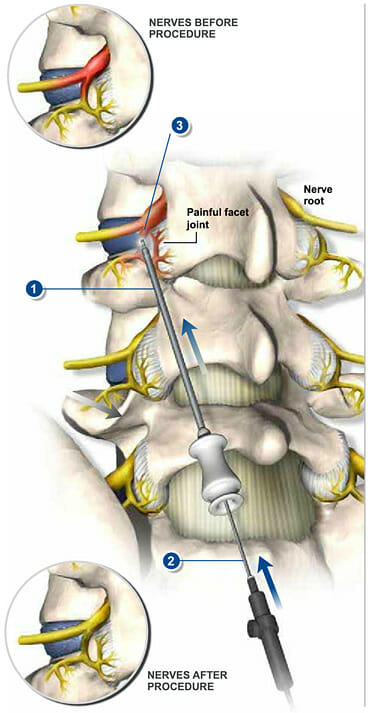What are Epidural Steroid Injections and Medial Branch Nerve Blocks?
November 12, 2019
Two interventional pain procedures which are commonly used in treating back and neck injuries, especially injuries resulting from car accidents, are epidural steroid injections and medial branch nerve blocks.
Generally, the injured party should go through conservative medical treatment – chiropractic and/or physical therapy – before seeking interventional pain options. However, every injury is different and the doctor(s) will know the treatment plan best suited for each patient.
What are Epidural Steroid Injections (ESIs)?
An epidural steroid injection is medicine which is injected into epidural space, which is a fat-filled area between the bone and the protective sac of the spinal nerves.
These are generally used as a diagnostic tool to confirm the injured location is being treated and the patient gains the desired relief. However, in some instances the pain relief can last longer. The steroid generally is a corticosteroid and an anesthetic numbing agent. See the image below from Mayfield Clinic.
As you can see in the graphic, the injection goes in the area between the vertebra and the dura sac. This is the epidural space, as noted above.
The goal of the epidural steroid injection is to reduce inflammation and, ideally, will flush away the proteins which are causing the swelling to the targeted area.
While the epidural injection cannot make a herniation smaller, people with a herniated disc are a candidate to have the injection and to gain relief from it. Other injuries which epidural injections can help treat are spondylolisthesis, spinal stenosis, degenerative discs and sciatica.
What are Medial Branch Nerve Blocks?
Another option which is generally available for patients are medial branch nerve blocks. Depending on the circumstances, these are generally done in one or two step diagnostic steps.

If the diagnostic block(s) succeed, the next step is a Radiofrequency Ablation (RFA) which is a medial branch nerve block, but the nerve is burned for a longer time so that the relief should last much longer, if not permanently.
See the second image above from Southeastern Spine Institute.
That said, one person’s results will not be the same for yourself. General medical literature states that the period of relief from the RFA lasts anywhere from nine to twenty-four months. Be aware that everyone is different, and everyone will heal differently.
Some people may only get relief for a few months while someone else can experience permanent relief.
Specifically, the medial branch nerves are small and are attached the sides of the facet joints in the spine.
The purpose of the medial branch nerves is to carry pain signals from the facet joints to the brain. The way a medial branch nerve block works, and subsequently an RFA, is the doctor uses a needle which is anywhere from 70 to 90 degrees Celsius to burn the nerve(s) which is sending the pain signal to the brain.
During the radiofrequency ablation, the doctor will place the needle to each intended site for about 90 seconds to gain the appropriate relief. So, for the branch blocks, the doctor will do it for a much shorter time since the initial branch block is diagnostic.
This procedure is minimally invasive and only takes 30-45 minutes to complete, generally. The doctor will use a local anesthetic to the area of skin where the needle is inserted to minimize any potential discomfort for the patient.
If you have any questions about these types of injections or anything else relating to your personal injury claim if you were in a car accident, I would be happy to speak with you.
It is free to do so and I am easily accessible by email David@pipaslaw.com or you can call me at my Tampa office, 727-888-3925.

SITE CREDIT
PRIVACY POLICY
© COPYRIGHT 2017-2024 PIPAS LAW GROUP | ALL RIGHTS RESERVED
What is the typical timeline of a personal injury case?
Who Pays For Car Repairs After An Accident In Florida?
Why Tampa Car Accident Cases Rarely Go To Trial
popular BLOGS
360 Central Avenue Suite 1570 St. Petersburg, Florida, 33701
Ph: 727-888-3925
Fax : 727-258-0082
MAIN OFFICE
Dade City | Zephyrhills | Port Richey | Trinity | Riverview | Tampa | Lakeland Bradenton | Sarasota | Orlando | Lutz Clearwater | Brandon | Saint Petersburg| Wesley Chapel | Apollo Beach | Largo | Brooksville | Spring Hill | Palm Harbor | Gainesville | Ocala
AREAS SERVED
PIPAS LAW GROUP
SCHEDULE A FREE CONSULTATION
Gainesville office